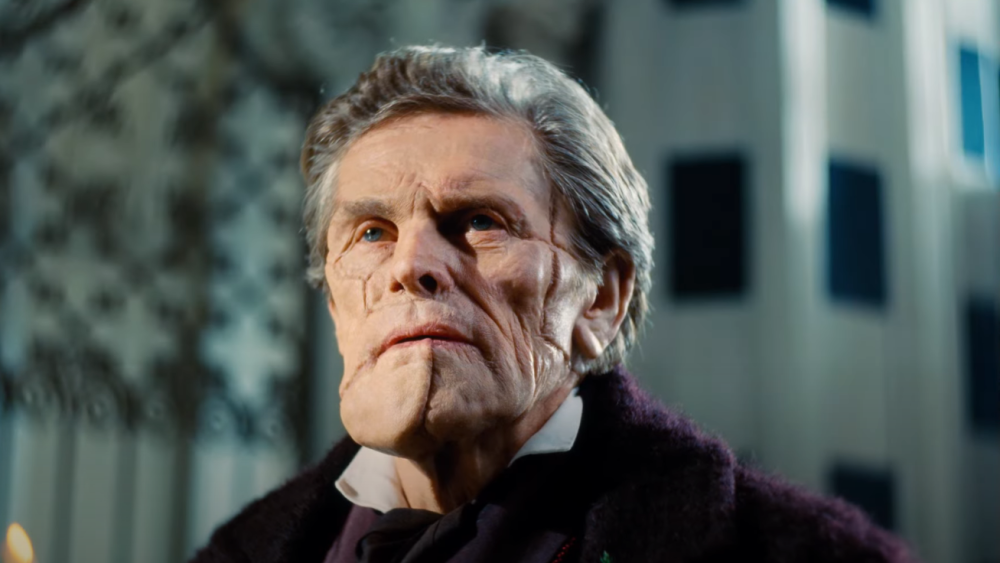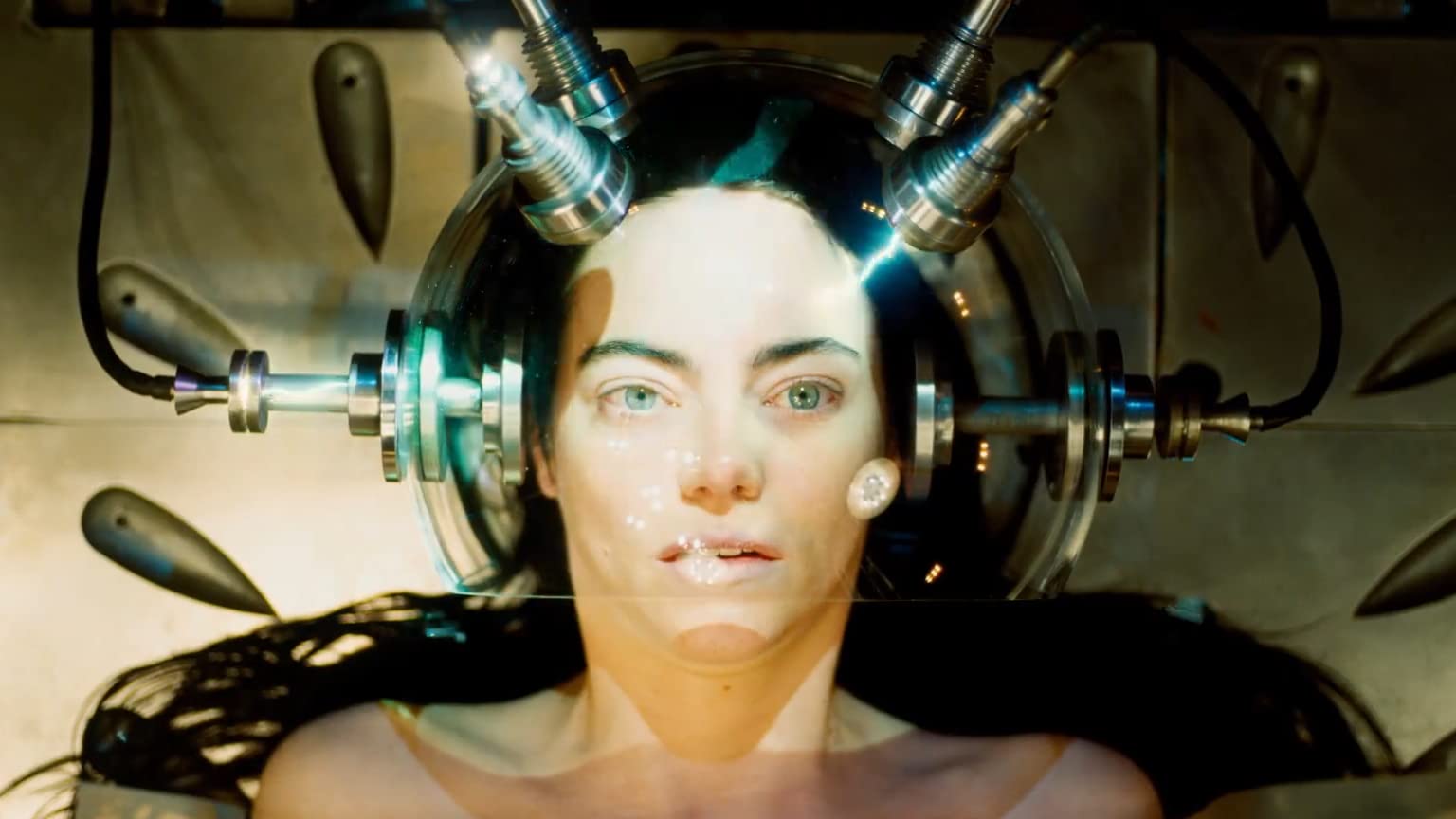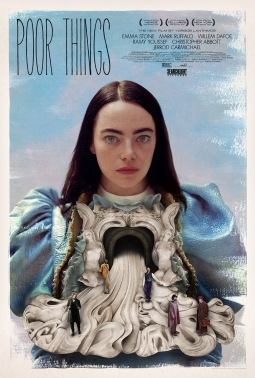A film review by Cliff Homewood
“Poor Things is the title and that’s what it’s about. In the way we try to control each other and our ideas, and people’s bodies and people’s views,” Tony McNamara, screenwriter.
If you want to see Emma Stone naked then this film is for you. If you want to see a good satire, it’s also for you. If you are hanging around at the door unsure, why not come in, what you got to lose? Orthodoxy will be taken with your coats.
If Frankenstein was a woman we’d be fucking not fighting.
 Poor Things has won over 50 Awards. Based on a book, the Director, Yorgos Lanthimos, met with the author, Alasdair Gray, who, aged 80, and ‘a delightful chap’, died before the film was finished. His son Andrew was ‘very happy’ with the film. In the book a picture of Bella is created from contradictory men’s accounts, for the film they decided to use Bella’s perspective. Sorcha Dallas, custodian of the Alasdair Gray Archive states, “Alasdair is to Glasgow what Charles Dickens is to London”. The award-winning novel included Scottish philosophy, maps and pictures. The film is not set in Scotland although Willem Dafoe’s disfigured character, Godwin, retains a Glaswegian accent. Lanthimos wanted to make a modern version of an old Hollywood studio picture where everything is stylised. The sea can look impressionistic, and this almost painted view of the world helps add to the fantasy portrayed. Poor Things reminds me of the Director’s early film Dogtooth with its father’s desire to keep his child safe from the ugliness of outside. The father, Godwin, is called God throughout the film by Bella, his creation. Her creation is omitted from the trailer as they didn’t want to mislead that it’s a horror film. Like Frankenstein his creation experiences the horrors of the world. Young Frankenstein was an inspiration. Although the outside world is shown in glorious colour, her home, the world she knows, is in black and white and her creation riffs on old Frankenstein movies. The trailer makes the film looks barking mad; it doesn’t disappoint. Animal hybrids wander around like rejects from The Island of Dr Moreau. Invasion of the Body Snatchers (1978) portrayed a dog’s body with a human head, this carries on the mismatches, God likes to experiment. The ways of science are criticised with Godwin’s experience at its cold ruthless hand. But also used in Bella’s analytical way of looking at the world. Examining.
Poor Things has won over 50 Awards. Based on a book, the Director, Yorgos Lanthimos, met with the author, Alasdair Gray, who, aged 80, and ‘a delightful chap’, died before the film was finished. His son Andrew was ‘very happy’ with the film. In the book a picture of Bella is created from contradictory men’s accounts, for the film they decided to use Bella’s perspective. Sorcha Dallas, custodian of the Alasdair Gray Archive states, “Alasdair is to Glasgow what Charles Dickens is to London”. The award-winning novel included Scottish philosophy, maps and pictures. The film is not set in Scotland although Willem Dafoe’s disfigured character, Godwin, retains a Glaswegian accent. Lanthimos wanted to make a modern version of an old Hollywood studio picture where everything is stylised. The sea can look impressionistic, and this almost painted view of the world helps add to the fantasy portrayed. Poor Things reminds me of the Director’s early film Dogtooth with its father’s desire to keep his child safe from the ugliness of outside. The father, Godwin, is called God throughout the film by Bella, his creation. Her creation is omitted from the trailer as they didn’t want to mislead that it’s a horror film. Like Frankenstein his creation experiences the horrors of the world. Young Frankenstein was an inspiration. Although the outside world is shown in glorious colour, her home, the world she knows, is in black and white and her creation riffs on old Frankenstein movies. The trailer makes the film looks barking mad; it doesn’t disappoint. Animal hybrids wander around like rejects from The Island of Dr Moreau. Invasion of the Body Snatchers (1978) portrayed a dog’s body with a human head, this carries on the mismatches, God likes to experiment. The ways of science are criticised with Godwin’s experience at its cold ruthless hand. But also used in Bella’s analytical way of looking at the world. Examining.
Bella’s look is based on an old Egon Scheile painting, Nude girl with long black hair and black blue drape. The Director needed someone who could be totally uninhibited and found it in Emma Stone, willing to do whatever Bella would. A brave and fully committed performance. Mark Ruffalo was fed up of playing Mark Ruffalo and took a risk with this film. He felt the character was not him, saying they should cast Joaquin Phoenix instead “as he can play anything”. He was assured by the Director the part was him. Whilst outwardly confident the character contained the same insecurities.
 Bella comically dances towards danger, with those that care trying to stop her. Thus is much of the comedy born. Note I did not say care for her. Men are generally shown as selfish, concerned only with their own interests. And the one that may not be, Max, is shown as weak and feeble, unable to stand up to things. Everybody wants something darling.
Bella comically dances towards danger, with those that care trying to stop her. Thus is much of the comedy born. Note I did not say care for her. Men are generally shown as selfish, concerned only with their own interests. And the one that may not be, Max, is shown as weak and feeble, unable to stand up to things. Everybody wants something darling.
It’s a fish out of water tale like Stranger in a Strange Land. The filmmakers approached most scenes with ‘how do we make it funny?’ They succeeded. A baby will throw food in your face and think it’s funny. Supplant to an adult woman doing that. Now you have the character of Bella. She keeps this innocence throughout the picture, reacting to the adult world like a child. Creating a similar comedic situation to Big, although the film’s not as warm hearted and goes to some quite savage places. But she survives and grows and thus becomes a fully rounded person by the end of the film. It reminded me of Kubrick in its analytic overview of life.
Emma Stone states that it is about a woman, “who doesn’t have to deal with shame.” “A human being that has a chance in the world – someone who hasn’t been moulded in a very specific manner to perceive the world in a certain way. She gets to start clean, and that gives her a far freer view of things. She’s a 28-year-old woman who, up until then, had lived a life that obviously didn’t satisfy her. And she comes back with a blank slate, able to start again, and to own that life.”Lanthimos adds, “Being moved or laughing is something you can’t help but experience by feeling. I appreciate that much more than the intellectual part of it. You can think, ‘Oh, this is a great film because of this and this’, but if you don’t experience it in the moment, if you don’t feel something, even if you don’t know what it is, then what’s the point?”
 The film gives you the curiosity of Bella. What’s going to happen next as she jumps into life with both feet. God decides it’s up to her to make her own mistakes. She learns philosophy and becomes self-educated in the ways of the world. Sadomasochism is touched on but not dwelt upon. For the squeamish operations are shown but can be dealt with. Death is dealt with early on. Some images aren’t real but metaphoric as the world becomes a crumbling castle around her.
The film gives you the curiosity of Bella. What’s going to happen next as she jumps into life with both feet. God decides it’s up to her to make her own mistakes. She learns philosophy and becomes self-educated in the ways of the world. Sadomasochism is touched on but not dwelt upon. For the squeamish operations are shown but can be dealt with. Death is dealt with early on. Some images aren’t real but metaphoric as the world becomes a crumbling castle around her.
This is Barbie for adults. Barbie was about the objectification of women. This is about making your way in the complexities of the world; how different people want different things from you. How men seek to control women, especially in the Victorian era. One way we seek to control is by negatively labelling someone, I was disappointed to see Barbie propagating such ideas. Poor Things asks if female sexuality is inhibited by society, otherwise they would be out there as much as men, and men getting jealous, as Bella is attractive, she can get it more. The desire to thus own and control. However, Barbie was written and directed by a woman, this was not. Poor Things presupposes a woman can enjoy sex as much as a man, which is true, but not all women do. It’s why a man should take the time for whatever the woman requires as his satisfaction is in the bag so to speak.
Willem Dafoe points out, “I think why people talk about the sex is because some of the attitudes towards sex in the film are surprising. It’s not the actual sex scenes. I mean, it’s fun to talk about, and it’s what people gravitate towards, because everybody’s either concerned or confused or depressed about sex. So, it’s a hot topic, but that’s not what the movie’s about. The movie’s about liberation and being free of a certain kind of conformity and a certain kind of deadening conditioning.”
If you was to show me this film and ask who the Director was, I would have said Jeunet. A compliment. Jeunet is the director who gave us the classics The City of Lost Children and Amelie. It takes the oddness of The Favourite and turns it up to 7. An unforgettable experience where you take joy in anticipation of what Bella will do next, social norms are not for her. A character who may introduce herself with, “Hello. Have you pleasured yourself recently? It’s rather good isn’t it?”

